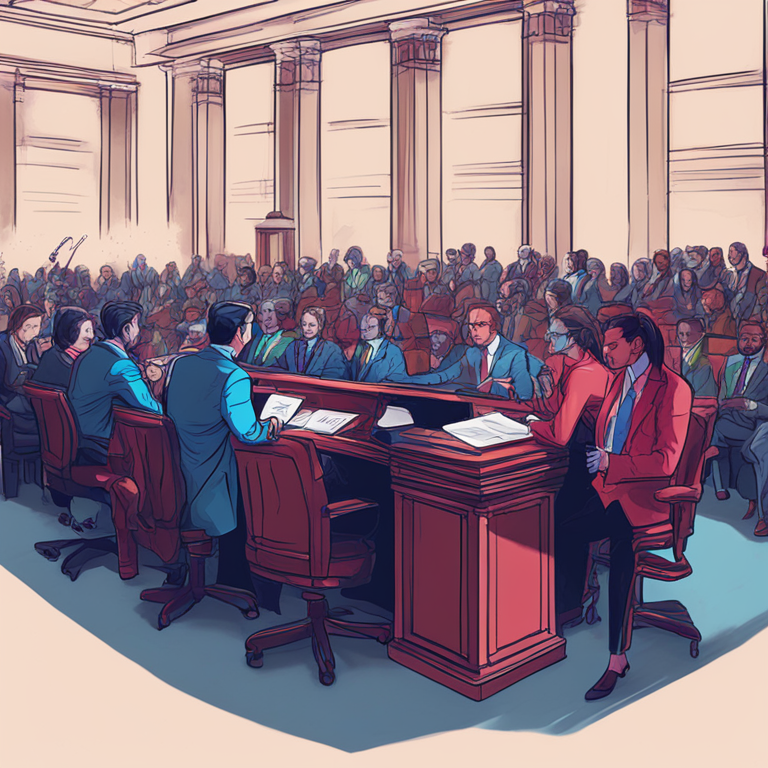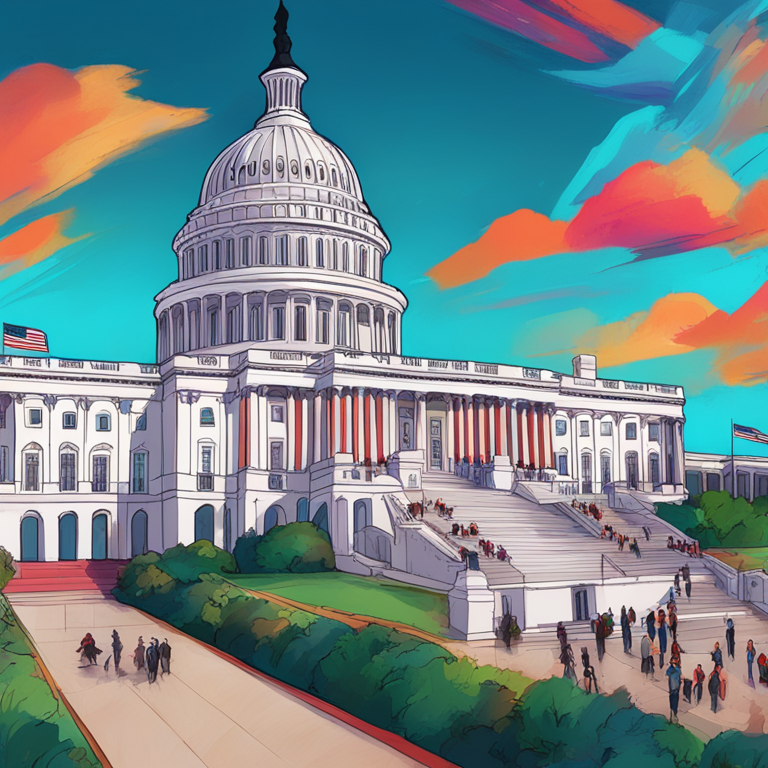
Introduction
Hey there, fellow crypto enthusiasts! Pull up a chair, because we've got some exciting updates for you. Picture this: legislative drama, political shenanigans, and a healthy dose of blockchain buzz – all wrapped up in the latest happenings on the crypto bill front. As the 2024 election season gets closer, our friends in the US House and Senate are bustling about trying to push forward, stall, or derail legislation that could shape the future of cryptocurrency in America. So, whether you're a crypto newbie or a seasoned hodler, stay tuned as we dive into the nitty-gritty of what's cooking on Capitol Hill.
House progress
Joint Resolution 109

Alright, let's start with the big news: Joint Resolution 109. House members recently passed this resolution with a 228-182 vote – quite the spectacle if you ask us. But before you pop the champagne, it’s worth noting that this resolution, which aims to invalidate the SEC’s Staff Accounting Bulletin (SAB) 121, has a few more hurdles ahead. SAB 121 has been quite the party pooper for the crypto community, setting stringent guidelines that many believe stifle innovation. The House sent this resolution over to the Senate, but with a Democrat majority that isn't exactly crypto's BFF, its fate is hanging by a thread. Even if it makes it through, President Biden himself has threatened a veto. Talk about drama.
Other bills in the House
Now, Joint Resolution 109 isn’t the only crypto bill trying to squeeze through the corridors of power. A handful of other bills are jostling for attention, but so far, they haven’t hit the House floor for a full vote. We’ve got the Blockchain Regulatory Certainty Act, which promises to remove some of the murky waters surrounding blockchain regulation. Then there's the Clarity for Payment Stablecoins Act, a much-needed effort to provide clear guidelines for stablecoins so they don’t end up in regulatory limbo. The Keep Your Coins Act, focused on protecting personal digital wallets, and the Financial Technology Protection Act, aiming to combat financial crimes in the crypto space, are also sitting in committee purgatory. But don't lose hope yet; the latest buzz is that the Financial Innovation and Technology for the 21st Century Act, or the FIT Act (because who doesn’t love a good acronym), is inching closer to a House floor vote. Fingers crossed it gets the green light.

Senate roadblocks
Ah, the Senate—where dreams go to take a lengthy nap. While the House is bustling with crypto-related bills, our friends in the Senate seem to have other plans. To be fair, it's not all about leisurely brunches; there are some serious bottlenecks and political hurdles.
For instance, many promising crypto bills in the House, like the Blockchain Regulatory Certainty Act and the Clarity for Payment Stablecoins Act, make it out of committee but face an 'out-of-office' tag once they reach the Senate. It's a tough job making sure everyone understands what "blockchain forks" mean. Too bad there's no 'blockchain for dummies' available in the Senate's library.
One major reason is the lack of interest from committee heads. Yes, even when bipartisan support exists, these proposals don't get enough attention to even make it onto the agenda. Seriously, it’s like trying to get everyone to agree on pizza toppings during a government shutdown.
On top of all this, the Senate is scheduled to recess on May 24 until June 3. This means any progress made is likely to enter a deep freeze, leaving these bills hitting the pause button faster than you can say 'crypto winter.'

Digital Asset Anti-Money Laundering Act
The Digital Asset Anti-Money Laundering Act is the brainchild of some heavy hitters: Elizabeth Warren, Roger Marshall, Joe Manchin, and Lindsey Graham. Despite the bipartisan digits on this bill, it’s yet to grab the golden ticket to the Senate floor. Cue the world's tiniest violin.
The goal here is noble: fighting financial crime by tightening regulations around digital assets. But getting everyone on board is about as easy as teaching your grandma to use a smart contract. The bill has been the topic of multiple Senate Banking Committee hearings, yet it remains in the metaphorical waiting room.
It's not that Warren and friends haven't been trying. They've outlined comprehensive plans and faced down scrutiny like pros. But as it stands, the bill hasn’t been marked up or voted on, more stuck than a bitcoin transaction during peak times.
So, while this bill aims to bring in much-needed regulation and oversight, its journey so far is like my diet plan: full of good intentions but lacking follow-through.
Responsible Financial Innovation Act
Here comes the dynamic duo: Sens. Cynthia Lummis and Kristen Gillibrand, presenting the Responsible Financial Innovation Act. This piece of legislation promises smarter, more efficient regulations for the crypto sphere. Think of it like the Marie Kondo of financial laws: keeping what sparks joy and tossing what doesn’t.
Last summer, they brought a revamped version of their bill to the Senate floor, hoping to light a fire under the legislative process. Spoiler alert: the wood was a little damp. The bill hasn't progressed much, overshadowed by other pressing issues like inflation and midterm elections.
The bill aims to balance innovation with consumer protection, a bit like walking a tightrope over a pit of regulators and anxious crypto investors. It's ambitious, sure, but even the best ideas can't seem to catch a break in the current political climate.
While the bill's intent is sparkling and fresh, its current status is more like a forgotten loaf of bread in the back of the pantry—needing some serious attention before it goes moldy.
Political dynamics
In the grand drama of politics, no discussion is complete without sifting through the tangled web of power plays. And when it comes to crypto legislation, the field is no different. Let’s dive into the political jungle, where vetoes and powerful senators roam free.
President's veto
Even if a crypto bill dances its way through the house and miraculously clears the Senate, it still has to face the final boss: President Biden’s veto. Yep, that's right, the Biden administration has already signaled that it would veto legislation that limits the SEC's role. Consider it the presidential equivalent of flipping the Monopoly board.
The administration's stance is pretty clear: they believe doing so would lead to substantial financial instability and market uncertainty. In other words, they don’t want the SEC feeling like it's been downgraded to crypto hall monitor.
So, while Congressmen might dream of regulatory reform that curtails the SEC, doing so would likely end with a dramatic presidential veto. The message is clear: keep the financial regulatory framework comprehensive and effective, or prepare to meet the big red stamp.
Crypto bills may have the support of some in Congress, but unless they can navigate this presidential roadblock, they’re more likely to find themselves face-to-face with a veto.
Influence of key senators
Let's not forget the role of power brokers in all this legislative hullabaloo. Take Sen. Elizabeth Warren for instance, whose influence within the Biden administration is like a fine-tuned crypto algorithm—powerful and strategic.
Warren hasn’t just been sitting back sipping coffee; she's been influencing key appointments and pushing for tighter regulations. But, as noted by Blockchain Association CEO Kristin Smith, she hasn't always been successful in getting legislation passed. It's a bit like having a high-powered trading bot that occasionally malfunctions.
Then there are stalwarts like Cynthia Lummis and Kristen Gillibrand, who are smashing the bipartisan stereotype and actively working on crypto-friendly legislation. Their commitment is heartening but often slows down by the political inertia that's about as fun as explaining NFTs to Uncle Bob at Thanksgiving.
To sum up, while key senators wield considerable influence and have the power to sway debates, actually converting bills into laws is a whole different ball game. Think of it like trying to run a marathon in molasses; progress is made, but it's slow and sticky.

Upcoming activities
Attention all crypto enthusiasts and digital currency connoisseurs! Grab your popcorn, because the legislative drama surrounding cryptocurrency is unfolding faster than you can say "blockchain." The US House has been making some waves with new bills aimed at regulating the crypto market, but it's no Broadway play—think more high-stakes poker with a sprinkle of political intrigue. Yep, you heard that right; it's time to scroll through the latest legislative craze making its way through Congress.
Recess schedule

First things first: mark your calendars, because both the House and the Senate will be taking a little "me-time" from May 24 to June 3. It's like summer break, but for adults in suits. This temporary pause means that any progress on crypto-related legislation will be hitting the snooze button for about ten days. So, if you’re eagerly waiting for your favorite crypto bill to get a nod, take a deep breath and maybe use that time to catch up on the latest episodes of your favorite series—or, you know, read up on blockchain tech.
Future votes
When the grand return happens, expect a flurry of votes that could either make you cheer or tear up a little inside. House Financial Services Committee Chairman Patrick McHenry hinted that the Financial Innovation and Technology for the 21st Century Act, also known as the FIT act, is heading for a floor vote later this month. Think of it like the season finale of a cliffhanger-filled drama series. Meanwhile, over in the Senate, several crypto bills are still waiting for their time in the spotlight. Elizabeth Warren and crew have their Digital Asset Anti-Money Laundering Act teed up, but markups or votes are yet to be scheduled. Call it a slow burn, if you will.
Conclusion
While the wheels of legislative progress may turn slowly, one thing is for sure: the crypto landscape is evolving, and lawmakers are ready to jump into the fray. Whether these bills ultimately pass or not, the debates themselves are bringing much-needed attention to the intricacies of cryptocurrency regulation. So sit tight, and keep an eye on the news—you wouldn't want to miss the next chapter of this legislative thriller.
Ethan Taylor
Ethan Taylor here, your trusted Financial Analyst at NexTokenNews. With over a decade of experience in the financial markets and a keen focus on cryptocurrency, I'm here to bring clarity to the complex dynamics of crypto investments.



